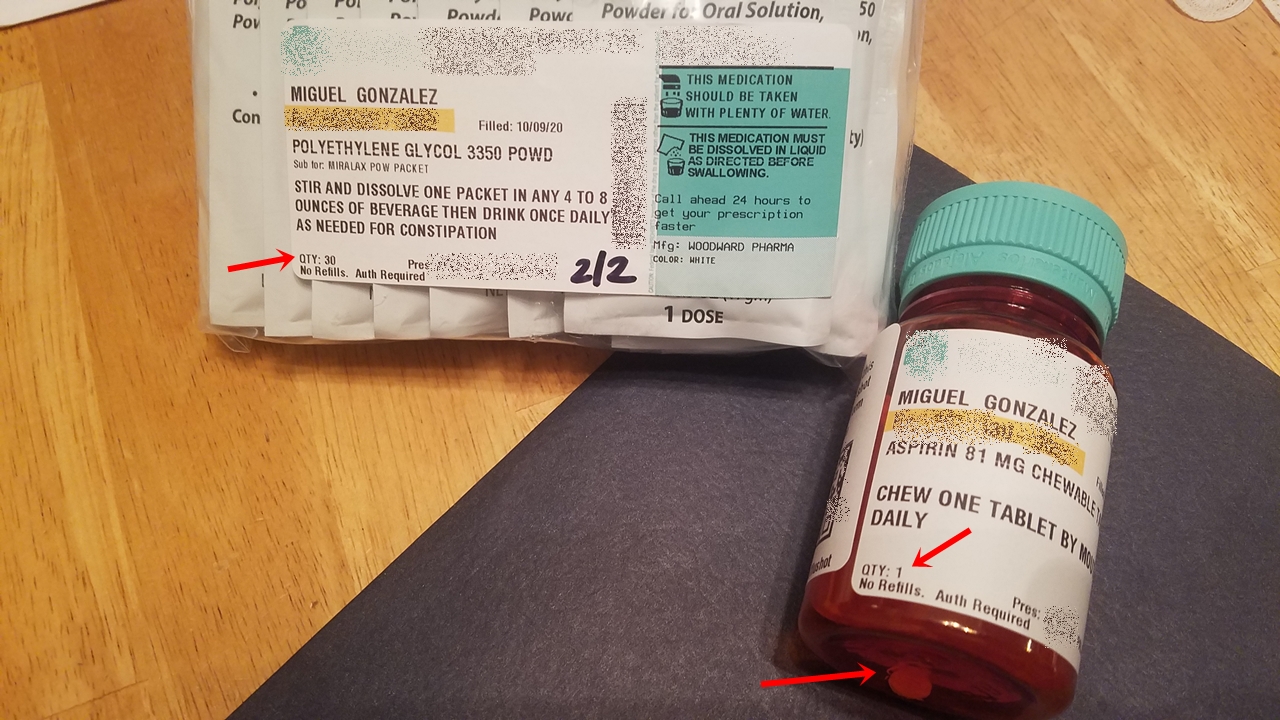This here is a two level fuck up in a very simple prescription issued to me

Polyethylene Glycol is a laxative that goes under the commercial name of MiraLAX. And aspirin is just plain old chewable aspirin for heart attack prevention.
The missus brought the meds home and these were two of the things the doctor ordered. I got 30 bags of laxative, to be taken once a day for 30 days and then I got ONE (1) chewable aspirin with no refills.
That does not seem quite right, does it?
Like many, I am sure, I did not read the prescriptions when I got them and just turned them the pharmacist. Needless to say that I was a little bit shocked at getting 30 doses of laxative because as much as full of shit I can be, it does not require that many to do a total colonic clean up. I had made a copy of the prescriptions to take to my regular doc when I see him next week, so I went over them and yes, the ones for those two meds were written like that. So the issuing doctor screwed that up which is bad enough, but what the fork happened with the pharmacist? Doesn’t he/she have a bit of brains between the ears and think, “You know boys and girls, this does not look right. How about I make a quick phone call to the doctor and confirm that the patient is not going to shit himself to death?”
This mix up is funny and not dangerous in my case, as I have been blessed with certain amount of common sense. But what about other people with blind faith in the medical profession being wrongly prescribed meds with the wrong dosage?
And all of the sudden you understand why we have 200,000 medical malpractice deaths in the US every year.

Fortunately, also, the aspirin is an OTC drug so you can “fix” this on your own and very cheaply.
Re the mixup, likely a pharmacist assistant just plugged the scripts into the computer, which would have checked for combinations with potentially bad interactions or dosage levels – which is great but lacks a sense of situational appropriateness.
The real question is, what are you gonna do with those 29 extra packets?
I may end up in the news…or not 😉
Trust, but verify.
Obviously you’ve spoken at length w/ the Dr. and he’s trying to tell you something.
Surprised your pharmacist did not tell you to go to the pain medication aisle and grab the aspirin yourself. Same with the laxative. (Unless it was prescription strength laxative.)
Your point is 100% valid though. There is this belief that somehow doctors are superhero scientists who never screw up. If the doc prescribes something, people just take it, without question. If Dr. Fauci says jump, people ask how high?
I even challenged my Assembly representative on something during the panicdemic, and his response was “I do not want to be the fool that goes against the advice of the experts.” That does not mean you have to blindly trust the advice of the experts without at least asking them to explain the reasons for their opinion/decision/advice. Worst case, you learn something in the process.
I don’t think the number of malpractice suits are really an indicator of medical incompetence. I think it has more to do with our increasing tendency to make lawsuits our preferred way to make your fortune. There are more and more people running around with lawyers on retainer 24/7, constantly on the lookout for something, ANYTHING that they can turn into a lawsuit to squeeze some money out of “people who have plenty to spare”. Malpractice suits are a favorite. /All it takes is the slightest seemingness of error on the part of doctors, and you have your grounds. This is why litigation….and massive insurance….is crushing the good out of what remains of America. This is the main reason why you can’t just go and pay out of pocket to doctors….someone has to pay for all those insurance premiums to protect him in the event he makes a mistake on one of his dozens of patients, otherwise it would be difficult to keep your clinic or any of your personal wealth. No one never makes mistakes.
Obviously malpractice suits are meant to keep doctors honest and to make them do their best, and to give a client who is seriously negatively effected by a mistake some recompense, but they have massively screwed it up.
I have a feeling you did not read the post right:
200,000 medical malpractice deaths in the US every year.
The pandemic is supposed to be responsible so far for 214,000 deaths and we lost our collective shit. Medical personnel kills that many EVERY year.
Being a prescriber, myself, I am pleased your medication error was of the level that it was. For myself, I am pleased when a patient asks me why I am prescribing (whatever), and how they are supposed to take it.
You mentioned one safety feature present in old school, paper prescriptions, absent in electronic prescribing:” Hey, doc? Did you mean to prescribe me 1,000 doses of Imodium? (An anti diarrhea medicine). I thought you wanted me to take indocin (generic : indomethacin) twice a day for ten days?”
On the other hand, my scribble is barely legible, so, legible e-scripts have their own advantages.